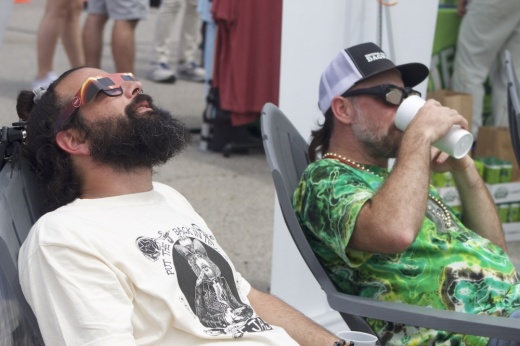The Dripping Springs community gathered on the street to witness a rare celestial event—a total solar eclipse. Spectators were clearly able to see the moon cover the sun for about three minutes despite clouds overhead.
What happened
The city-led event, aptly named the “sunblock party,” was about two years in the making, with much of the planning done by the Dripping Springs Communications Director Lisa Sullivan. Sullivan teared up during totality and said she was “emotional the whole time.”
“I can’t even put it into words,” Sullivan said. “For the city to come together like this, I can’t describe it, it's one of the best experiences in my life.”
The party that stretched across downtown Dripping Springs included live entertainment, vendors, food and access to the shops on the street. Visitors were given certified eclipse glasses, with a solar filter safe to view the sun and view the celestial phenomena together.

“Currently it is approximately a one-hour drive from Wimberly to San Marcos,” officials wrote on Facebook at about 3:10 p.m. “All other traffic in the county shows to have minor delays.”
In their own words
Attendees included locals, business owners and even travelers from outside of Texas.
Couple Brian and Hannah Hill came from Virginia to watch the event, and Brian Hill, who grew up in Texas, said he’d been planning to see it for 15 years.
“We got married two years ago, not even, and I told her, we don't have a lot of big plans, but we need to go back to Texas [for this],” Brian Hill said.
Locals Kelsey McDaniel and Alex and Mirand Pylypec said they live close by and looked forward to seeing the community come together.
“We really enjoyed [Dripping Springs] Founders Day festival as well,” Alex Pylypec said. “And we heard that Mercer Street would have a lot of the same local vendors, [so] we came out to support.”
For the few minutes of totality, employees of businesses on Mercer Street, including boutique Vintage Soul, stepped out to view the sky.
Nicole Hoffman and Monica Sheldon from Vintage Soul said it had been fun to interact with all of the tourists coming by the store, and named South Africa and Europe as some places they’d had visitors from.

City officials told Community Impact they predicted the event to almost “quadruple” the population.
In preparation, City Council members passed a resolution March 19 declaring a local disaster. This allowed officials to activate the emergency services plan and provide extra support in case of an emergency, as a strain on cellular towers, traffic and emergency service was expected.
Campsites and hotels are filled up in the area, including the Courtyard by Marriott and Henly RV Park. Rental company Airbnb officials said Austin and the Hill Country were among the most booked areas in the path of totality.
Dripping Springs ISD students had off for the day and received a free pair of glasses thanks to a sponsorship from the Dripping Springs Community Library.
The takeaway
An exact number is not yet clear, but city officials anticipate collecting on the 7% hotel occupancy tax rate for hotels and other rentals, which will go toward future tourism opportunities for the city.
The next total solar eclipse won’t be until 2045 in the northern part of the state, while Brownsville residents will see one in 2052. Experts predict that Central Texans won’t see another total eclipse for at least 150 years, but partial eclipses will be seen every five to 10 years, as previously reported by Community Impact.





